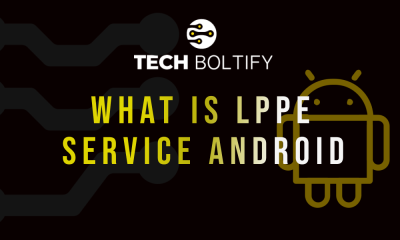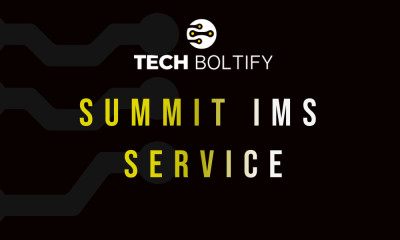Tech
Are ISP Proxy Servers Safe? Everything You Need to Know
There’s always that moment of pause when it comes to internet security. A second thought that someone might be trailing behind you. The idea of a virtual middleman—a proxy ISP server—might make you imagine mysterious figures in a dark room secretly taking your information.
But that is not the case. ISP proxy servers do not work undercover; they do it in the daylight, ushering in security and optimization that does not receive enough accolades.
Skepticism is expected, given the cavalcade of cyber threats lurking behind each pop-up advertisement.
But are ISP proxy servers safe?
More than secure, they’re remarkably beneficial. Whether you are surfing from a Parisian coffee shop or a Chicago office, an ISP proxy server operates in the background, streamlining your experience without hassle.
So, let us put aside those unverified alarms and understand why ISP proxy servers are safe and an extremely handy internet user utility.
1. Enhance Security
No one thinks about security until it’s too late. It’s like an umbrella; you never grab one until the rain starts pouring. ISP proxy servers work the same way, quietly shielding your connection before threats appear.
Sitting between your device and the internet, a proxy server blocks malicious sites, filters out harmful scripts, and keeps your real IP address hidden. This way, hackers never get a direct line to your system, making attacks much less likely.
The best part? No setup is required. Unlike firewalls and antivirus software that need constant maintenance, ISP proxies work behind the scenes, so you don’t have to do a thing. For businesses, that means fewer breaches, while for individuals, it means stress-free browsing.
However, one should always opt for ISP proxy servers from a reliable service provider. These providers have extensive coverage, dedicated support, customization solutions, and seamless integration.
2. Malware and Phishing Protection
Cyber threats never announce themselves with blinking lights. These attacks sneak in unnoticed through normal-looking emails or pop-up messages. The next thing you notice is that you’ve clicked the wrong link, and your screen gets flooded with alerts as your bank account loses money.
Proxy servers are your first defence line, blocking dangerous content from accessing your system.
These proxies employ advanced filtering systems to protect your system by scanning incoming web traffic to secure and terminate potential threats. Malware downloads? These threats can be prevented from advancing any further. Malicious phishers try to steal your sensitive information through trickery. The threats can be terminated before they inflict any damage.
This protection is good for businesses and individuals alike. One accidental click on a fake link and you could lose your identity and money or even have a full-blown security breach. Proxy servers ensure that this doesn’t happen by blocking access to high-risk websites and filtering out harmful data packets.
3. Preventing Distributed Denial-of-Service Attacks
You don’t have to be a master hacker to take down a website—just a flood of traffic in the right place at the wrong time. That’s the brutal simplicity of a DDoS attack. Overwhelm a server with enough bogus requests, and boom—it crashes, taking down businesses, services, or entire networks.
But here’s the good news: ISP proxy servers are the gatekeepers, stopping malicious traffic before it even gets to the target. They examine incoming requests, detect unusual patterns, and filter out suspicious activity before it can cause chaos. Think of them as security guards at an exclusive event—keeping the troublemakers out and letting the VIPs (legitimate users) in.
Without this layer of protection, businesses face downtime, losing money and reputation—and that’s what cybercriminals love to exploit. But with a proxy defence businesses can stay online, keep operations running, and not get caught in the crosshairs of an attack.
When it comes to security, it’s always better to block the punch before it lands.
4. Secure Remote Access for Businesses
Remote work is here to stay, and with it comes the challenge of connectivity everywhere. Employees log in from hotel rooms, coffee shops, and home offices on networks that aren’t as secure as they should be. That’s where ISP proxy servers come in, acting as a secure gateway between remote workers and their company’s internal systems.
Instead of letting employees log in directly to corporate networks, proxy servers verify credentials, filter data, and create an encrypted bridge. Sensitive information is kept out of reach of cyber attackers on unsecured networks, preventing unauthorized access and data breaches. Without this protection, companies risk exposing confidential files to unwanted eyes.
For companies that handle proprietary data or client information, a security breach could be catastrophic. Proxy servers mitigate these risks by providing controlled, monitored, and secure remote access so employees can work from anywhere without compromising their company’s network.
5. Increased Anonymity and Privacy
Privacy isn’t a luxury—it’s a necessity. Between targeted ads that seem to read minds and corporations gobbling up data on every click, anonymity online feels like a losing battle. ISP proxy servers are the answer, hiding you from prying eyes.
By masking the user’s real IP address, proxy servers make it hard for websites to track browsing habits. Advertisers, search engines, and social media rely on IP-based tracking to personalize content and ads. A proxy stops that in its tracks so you can browse without leaving a digital trail that leads right to your front door.
For those accessing sensitive information—whether financial data or confidential work documents—a proxy server provides an added layer of discretion. It’s like drawing the curtains at home, not because you have something to hide but because privacy should never be optional.
6. Encryption and Data Transmission
Data is valuable, and hackers understand that. Without encryption, hackers can grab sensitive information—login details, financial information, and confidential files as they move across the Internet. ISP proxy servers serve as a crucial protection tool, encrypting information so others cannot decipher it.
Encryption is akin to a coded message, readable by only those with the proper decryption key. Encryption shields companies that deal with sensitive communications, online shoppers typing in credit card numbers, and anyone who needs privacy.
Without encryption, transmitting information online is akin to sending an open postcard—anyone in the middle can see it. A proxy server guarantees the envelope shuts and is tamper-resistant.
For companies, data protection acts are all about encryption. ISP proxy servers provide an easy way to achieve this by automatically encrypting information without user involvement.
From company data to business assets, encryption is the keystone of protection, and proxy servers provide easy access.
Bottom Line
You don’t believe in an ISP proxy server on blind faith; you believe in them for what they provide. From security to speed, the servers provide tangible advantages to make the internet safer and more efficient. The cyber world is unsafe, but it doesn’t mean you must go out unarmed.
Rather than distrusting proxy servers, embrace them as a tool that streamlines, protects, and makes surfing easy. They labor behind the scenes without seeking praise, but their effect is absolute.
Trusting them isn’t smart; it’s necessary for a safer, faster, and more private internet.
Tech
How a Franchise Consultant Can Assist You In Expanding Your Tech Business
In today’s highly competitive technology sector, expansion is often a key goal for entrepreneurs seeking to grow their influence, revenue, and market share. One strategic pathway that many tech business owners consider is franchising. However, the complexities of franchising—ranging from legal frameworks to operational consistency—can be overwhelming without the right guidance. That’s where a franchise consultant comes into play. A skilled franchise consultant can be instrumental in turning a successful tech business into a scalable franchise model, ensuring both strategic growth and long-term sustainability.
Assessing Franchise Readiness
Before launching into franchise expansion, it is critical to determine whether your tech business is ready for such a move. Franchise consultants like Infinity Business Growth Network begin by conducting a thorough evaluation of your current operations, systems, branding, and profitability. This assessment helps identify if your business model is replicable and attractive to potential franchisees. For tech companies, which often involve specialized services or products, consultants also examine whether technical training and support can be standardized across locations.
Developing a Scalable Model
One of the main challenges in franchising a tech business is creating a model that can be easily duplicated. A franchise consultant helps you distill your unique business processes into a formalized structure. This includes the development of operations manuals, proprietary software guidelines, service protocols, and training programs. These tools must ensure that franchisees can deliver the same level of quality and innovation your brand is known for, regardless of their location.
In tech businesses, where service delivery or product development often relies on complex systems, consultants pay special attention to how those systems are documented and taught. Their aim is to reduce reliance on key individuals and build a framework that others can follow without losing efficiency or innovation.
Navigating Legal and Regulatory Compliance
Franchising involves significant legal considerations, including the development of a Franchise Disclosure Document (FDD), compliance with federal and state franchise laws, and trademark protection. A franchise consultant collaborates with legal experts to help you prepare all necessary documentation and ensure compliance with all regulatory requirements.
In the tech space, where intellectual property and data security are paramount, consultants also help you build legal safeguards into your franchise model. This includes guidelines for software licensing, protection of proprietary code, and adherence to data privacy laws across multiple jurisdictions.
Strategic Franchise Marketing and Recruitment
Once your franchise system is in place, the next step is attracting qualified franchisees. Franchise consultants assist in developing and executing a targeted marketing strategy to reach potential investors who align with your business vision. They know how to position your tech brand in the marketplace to attract entrepreneurs with the technical know-how or the interest to operate in the tech industry.
Moreover, consultants help you define the ideal franchisee profile and set up a recruitment process that screens for compatibility, competence, and cultural fit. This ensures that each new franchisee strengthens the brand rather than dilutes it.
Providing Ongoing Support and Performance Tracking
The role of a franchise consultant doesn’t end once the first few units are opened. Many consultants offer continued support, helping franchise owners refine their systems, improve training, and solve operational challenges. They can also help establish metrics and key performance indicators (KPIs) that allow you to monitor franchisee success and overall network health.
In the ever-evolving tech industry, where tools and trends shift quickly, having a consultant to assist with adapting and updating systems across the franchise network can be a major competitive advantage.
Conclusion
Expanding your tech business through franchising is an ambitious but achievable goal—provided you approach it with a solid strategy and expert guidance. A franchise consultant brings not only deep knowledge of franchising systems but also industry-specific insight to help you scale efficiently and sustainably. From evaluating readiness and creating replicable models to ensuring legal compliance and recruiting the right partners, their expertise helps transform your tech venture into a powerful, franchised brand. If you’re serious about expansion, partnering with a franchise consultant could be your smartest first move.
Tech
Why Cheap Residential Proxies Are a Game-Changer in 2025
Web scraping has always been a cat-and-mouse game – but in 2025, the stakes are higher than ever. Websites are no longer just blocking known datacenter IPs. They’re fingerprinting traffic, measuring behavioral signals, and using machine learning to detect non-human patterns.
If you’re still brute-forcing requests with the same old proxy lists, you’re probably hitting more CAPTCHA walls than clean data.
That’s why smart developers and data teams are taking a different approach: they’re switching to residential proxies – and specifically, to rotating residential IPs that are now widely available at budget-friendly prices.
In short: the game has changed, and the new advantage is going to those who scrape smarter – not harder.
Why Traditional Proxies Fall Short in 2025
A few years ago, datacenter proxies were the go-to option. They were fast, easy to scale, and cheap. But now they’re also highly detectable.
Modern bot defenses like Cloudflare, Kasada, and DataDome flag datacenter IPs instantly. Even if your script is well-written, using a flagged or repetitive IP will tank your success rate.
Some of the biggest challenges with outdated proxy setups include:
- IP bans after just a few requests
- CAPTCHAs on nearly every session
- Blocked access to login flows, pricing pages, or reviews
- Geo-restrictions that prevent you from viewing real content
These are no longer edge cases – they’re the norm for anyone scraping without a modern proxy layer.
What Makes Residential Proxies Different?
Residential proxies route your requests through real IP addresses assigned by internet service providers to actual users. That means every request looks like it’s coming from a real device – not a bot or a server rack.
Even better, rotating residential proxies automatically change IPs at set intervals or per request, simulating natural browsing patterns and distributing your traffic across a large, trusted IP pool.
This makes it harder for platforms to identify scraping behavior, and significantly reduces the risk of getting blocked – even on high-security sites.
The Power of Affordability
In the past, residential proxies were reserved for enterprise teams or deep-pocketed scraping ops. Monthly plans could cost hundreds (or even thousands) of dollars for consistent performance.
But thanks to broader adoption and more efficient infrastructure, that’s no longer the case.
You can now get cheap residential proxies with:
- Automatic IP rotation
- Geo-targeting by country or city
- Support for HTTPS and SOCKS5 protocols
- Flexible usage-based billing (by GB, request, or session)
- Easy integration into tools like Puppeteer, Playwright, or Scrapy
Some providers even offer free trials or low-cost plans under $30/month – making it possible for solo developers, freelancers, and startups to scale their projects without taking on unnecessary risk.
Who’s Winning with Smart Scraping in 2025?
- 1. E-commerce Analysts: Scraping product data, pricing trends, and availability from global markets without triggering rate limits.
- 2. SEO Professionals: Tracking SERPs and local search results from different cities, without being forced to use Google’s API.
- 3. Marketplaces & Aggregators: Monitoring inventory, listings, and seller data across multiple platforms in real time.
- 4. Travel Tech & Fintech: Collecting real-time pricing, availability, and user-facing metrics for fares, flights, or product offers.
- 5. Competitor Intelligence Teams: Analyzing pricing, content changes, and UGC (like reviews) at scale – without detection.
Across the board, rotating residential proxies help users access public data at scale, maintain consistency across scraping tasks, and adapt more flexibly to evolving platform defenses.
Scraping Success Starts with Smarter Infrastructure
In 2025, clean data isn't just about writing better scripts – it's about being invisible in the process.
If you’re still relying on cheap datacenter proxies or overused free lists, you’re putting your workflows at risk. Not only are you more likely to get blocked, you’re also wasting time on false positives, retries, and broken sessions.
Cheap rotating residential proxies give you a new path forward. They combine stealth, speed, and scalability – and thanks to better pricing models, they’re finally accessible to everyone.
Final Word
Web scraping is only getting more powerful – and more regulated. Platforms will continue to evolve. But so will the tools used to navigate them.
With rotating IPs, real-user behavior patterns, and affordable access, cheap residential proxies are one of the smartest infrastructure upgrades you can make in 2025.
If you care about reliability, consistency, and clean data – this isn’t just an option. It’s the new standard.
Tech
How to Choose the Best Proxy Service for Scraping: What Really Matters
In today’s data-driven digital landscape, web scraping has evolved beyond a niche tactic into a competitive necessity. From e-commerce retailers monitoring prices to financial analysts aggregating market trends, access to timely web data translates into smarter decisions. However, as websites bolster their anti-scraping defenses, businesses are increasingly relying on robust proxy services to keep operations running smoothly. That’s why choosing the best proxy service for scraping is no longer a secondary consideration-it’s a strategic imperative.
Why Proxies Are Essential for Web Scraping
At its core, a proxy acts as a middleman between a scraping tool and a website. Instead of connecting directly, your scraper uses an alternate IP address supplied by the proxy. This approach effectively masks your traffic, avoiding suspicion by distributing requests across various IPs. Without reliable proxies, your scraping tools are easily identified and blocked, leading to incomplete data or full-on bans.
The importance of proxies mirrors the explosive growth of the web scraping software market. Valued at $1.1 billion in 2022 and forecasted to reach $3.1 billion by 2030 (Grand View Research), the ecosystem now counts proxies among its most critical infrastructure components-especially as enterprises scale their data operations.
Key Factors When Evaluating Proxy Providers
IP Type: Datacenter, Residential, or Mobile
Not all proxies are created equal. Datacenter proxies are budget-friendly and fast-costing between $0.50 and $2 per GB-but because they originate from data centers instead of real consumer devices, they're easier to detect. Their success rate typically ranges from 70% to 80%.
Residential proxies deliver higher efficacy, often between 85% and 98%. These IPs are tied to actual user devices, making them more credible to anti-bot systems. However, they come at a premium, often costing between $10 and $30 per GB. Mobile proxies go a step further, routing through mobile carriers for maximum legitimacy. While highly effective, their steep pricing makes them ideal for critical or high-value scraping campaigns.
IP Pool Size and Geolocation Diversity
The size and variety of a provider’s IP pool significantly influence your ability to scrape different regions undetected. Leading vendors offer access to millions of IP addresses across numerous countries and ISPs. This geographic and network diversity not only supports geo-targeted scraping-such as retrieving product pricing in Germany or search engine results in Japan-but also ensures scraping continuity when some IPs are inevitably blocked or rate-limited.
Speed, Uptime, and Latency
Performance matters, especially when scraping at scale. According to Oxylabs’ 2023 benchmark report, top-tier residential proxies deliver near 99.9% uptime and robust speeds. Whether you’re tracking travel fares daily or integrating live feeds into an analytics dashboard, choosing a high-availability provider minimizes disruptions and avoids data bottlenecks.
IP Rotation and Session Control
Modern scraping operations demand flexible request handling. Look for proxy services that support automatic IP rotation, which changes IPs on each request to reduce detection risk. More advanced use cases benefit from sticky sessions-helpful when navigating multi-page workflows or maintaining consistent logins during scraping sessions.
Some of the most sophisticated providers use AI to manage IP pools strategically, evade captchas, and optimize request cadence-dramatically improving scraping efficiency.
Legal Compliance and Ethical Sourcing
Legal risks around scraping are increasingly visible. The high-profile 2023 case of Bright Data vs. Meta highlighted tensions surrounding data ownership and public accessibility. Choosing a proxy vendor that adheres to GDPR and CCPA compliance while sourcing IPs ethically through user opt-ins helps reduce risk and maintain operational integrity.
Scalability and Integration Capabilities
As your data needs grow, your proxy solution should scale with you. Today’s leading providers offer flexible scalability and API integration, supporting everything from browser automation to full scraping-as-a-service platforms. Some even provide built-in scraping tools and browser emulation, significantly reducing in-house development requirements.
Cost vs. ROI: Understanding the Trade-Off
Premium proxies come at a cost, but the value they deliver far outweighs the expense. The alternative-frequent bans, slow scraping speeds, and low data quality-can harm productivity and decision-making. According to Deloitte Digital’s 2023 report, companies using high-quality proxies achieved ROI increases between 200% and 400% within just 12 months of implementation.
In a recent ScraperAPI survey, 42% of businesses credited robust proxy configurations as a key factor in the success of their pricing intelligence strategies.
What Lies Ahead: Smarter, More Integrated Proxies
The future of web scraping lies at the intersection of automation, AI, and infrastructure. Expect proxy services to advance via low-code integrations, automated switching based on performance, and closer alignment with data analytics platforms. As websites become more sophisticated in detecting bots, proxy solutions will focus on intelligent routing and compliance-first mechanisms.
Cloudflare reported an 18% year-over-year increase in bot traffic-much of it legitimate scraping activity. As organizations increasingly depend on external data for insights and revenue, proxies will become even more indispensable to their digital strategies.
Final Thoughts
Choosing a proxy service isn’t just about pricing tiers or volume of IPs. It’s about matching the provider’s capabilities to your scraping objectives-whether you need low-latency global coverage, dynamic session handling, GDPR compliance, or developer-friendly integrations. The competitive edge belongs to those who don’t just collect data-but collect the right data, reliably and responsibly.
For those seeking clarity in an increasingly complex marketplace, this curated overview of the best proxy service for scraping offers a valuable guide to getting started.
As data continues to shape how businesses compete and grow, the proxies they choose will play a critical role in determining the effectiveness of their strategies and the reliability of their insights.
-
Tech10 months ago
AI and Freight Management
-

 Tech1 year ago
Tech1 year agoLPPe Service Android App and its Functions – How to Remove it
-

 Tech1 year ago
Tech1 year agoWhat is a Permission Controller – Control Manager Notifications
-

 Tech1 year ago
Tech1 year agoWhat is Device Keystring App On Android
-

 Tech1 year ago
Tech1 year agoWhat is Summit IMS Service – How to Stop Syncing on Your Android Device
-

 Tech1 year ago
Tech1 year agoWhat is Carrier Hub – How to Resolve Processing Requests Issues
-

 Tech1 year ago
Tech1 year agoMeta App Manager – What is Meta App Installer
-

 Tech1 year ago
Tech1 year agoWhat is Cameralyzer Samsung – How to Fix or Uninstall Cameralyzer on Android

